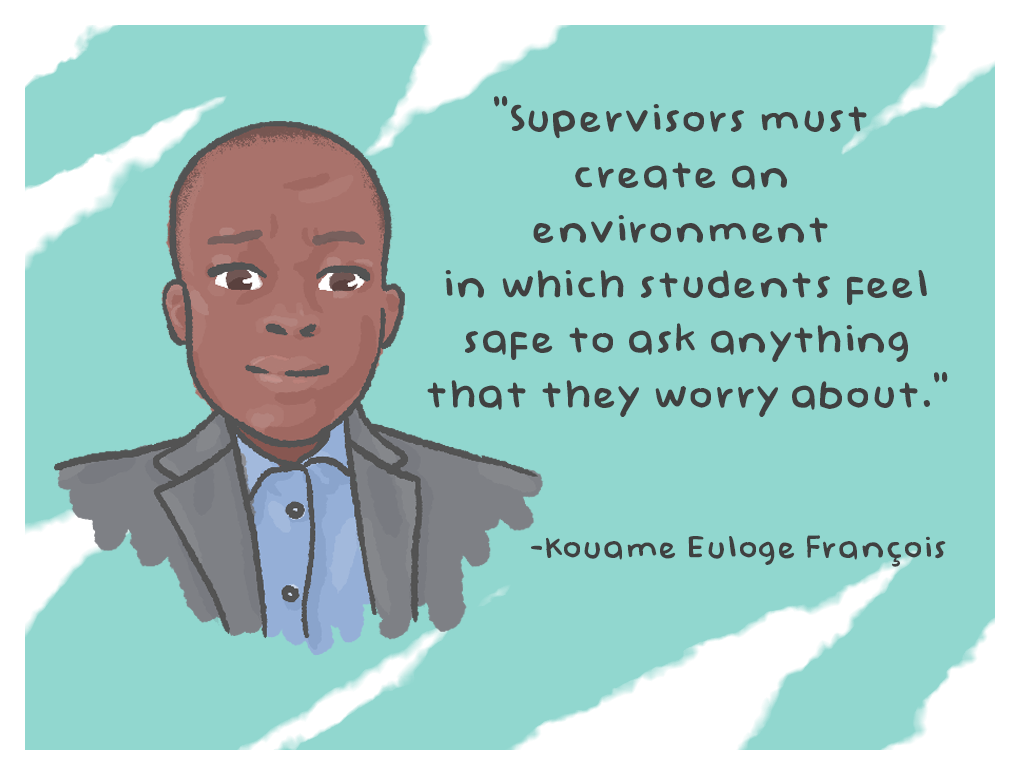What makes an effective supervisor as opposed to a lousy one? Kouame Euloge François lays out his ideas on the topic based on his experience supervising in Côte d’Ivoire.
Introduction
Successful completion of a Master and PhD is challenging for both the candidate and the supervisor. Generally, in West African higher education institutes and particularly in Côte d’Ivoire, there is not a clear adopted approach to (or model for) supervision. This lack potentially compromises the success of PhD and Master programs (Pammala (2019)).
The student-supervisor relationship is one of the most important, elements of graduate student success.
In several higher education institutions in Cote d’Ivoire, I have observed a range of outcomes in the completion rates of Master’s and PhD programs. These outcomes appear to be closely linked to the manner in which supervision is carried out and the research environment that is fostered.
In this paper, I endeavor to delineate several aspects that, in my opinion, have influenced the effectiveness of the supervision process. The predominant observation is that successful completions have invariably involved a form of ‘humanized’ supervision.
Lousy vs efficient supervision
Lousy supervision
I will start by highlighting two practices that could lead to lousy supervision (see Magnuson, S. et al. (2000) for more aspects).
Some supervisors do not recognize the needs of the student
Some supervisors sometimes fail to recognize or respond to the changing needs of supervisees. An initial assessment to identify supervisees’ needs is often not done. Supervisors must remember that supervisees are unique in who they are and where they are developmentally.
Some supervisors do not provide the correct environment
Supervisors sometimes fail to provide a safe environment by humanizing the supervision process. They do not recognise the relational/affective aspects of supervision (Countinho, 2021)

Efficient supervision
I will now outline several facets that contribute to humanizing the supervision process and, in turn, boost graduation completion rates based on my observations in Côte d’Ivoire. Humanized supervision entails recognizing aspects tied to the social, economic, and human needs of students. Therefore, it is essential to strike a balance between exacting academic standards and the human dimension, encompassing both academic rigor and compassion.
The task of finding the right balance of interaction between the need for academic rigor in a student’s work and the human dimension in the student–supervisor relationship is a major responsibility of a supervisor. They must excercise good practices, such as the following:
The supervisor must be available, open, and reliable
Supervisors must create an environment in which students feel safe to ask anything that they worry about. Answering students’ e-mails in a timely manner and being available for regular meetings.
I remember my own PhD supervisor, who was available, responding quickly to any email, giving feedback, and inviting me to meetings when necessary, and this helped me complete my thesis. Now I am adopting this attitude toward my master’s students.
Supervisor must be the confidant and contact person of the students
Supervisors must engage in some form of life coaching and give motivational talks when the opportunity arises in informal conversations. They must try to focus more on their daily concerns and activities, and on teaching the students skills as well as knowledge. Getting into non-academic discussions that touch on general issues of life enhances the emotional, spiritual, and general well-being of the students, which has a positive effect on their studies. Therefore, mutual trust is fundamental and critical in the context of student supervisor relationships (Khene, C. P. (2014), Daramola, O. (2021)).
Supervisor must be flexible and adaptable
During supervision, the supervisor must be ready to switch roles to being a facilitator, a director, and a critical friend, and to be responsive to the needs of the student as the occasion demands. Being flexible and adaptable could be beneficial to students rather than being rigid (Khene, C. P. (2014).
Supervisor must adopt a collaborative and interactive approach
Supervisors must promote social Integration in the research group. Encourage students to present their research and receive feedback from each other as well as other supervisors. (Khene, C. P. (2014).
This approach, adopted by two research units (one in mathematics¹ and one in computer science²) of the National Polytechnic Institute of Côte d’Ivoire, led them to have the highest PhD completion rate respectively in mathematics and computer science of all the higher educational institutions in the country for the last two years (2022 and 2023).
Conclusion
Adopting human supervision approaches as described above has led to success from what I have observed at three higher education institutions in Cote d’Ivoire in both Master’s and Doctorate programmes.
However, due to cultural and sociological environment, institutional regulatory and other factors, this kind of “humanized supervision” may not be as efficient everywhere as it has been in Côte d’Ivoire.
But for most West Africa higher education institutions sharing almost the same characteristics, we recommend the adoption of human supervision as a model.

KOUAME Euloge François
Virtual University of Côte d’Ivoire

1 Mathematics and New Information Technologies Laboratory (LMNTI)
² Research in Informatics and Telecommunication Laboratory (LARIT)
References
Coutinho, I. R. (2021). When We Look At The Supervisor Image In The Mirror, What Do We See? The Supervisors’ Mirror Image Regarding Doctoral Supervision. Advances in Social Sciences Research Journal, 8(2) 398-410.
Daramola, O. (2021). Lessons from Postgraduate Supervision in Two African Universities: An Autoethnographic Account. Educ. Sci. 2021, 11, 345.
Khene, C. P. (2014). Supporting a humanizing pedagogy in the supervision relationship and process: A reflection in a developing country. International Journal of Doctoral Studies, 9, 73-83.
Pammla Petrucka (2019). Doctoral supervision in developing countries: desperately seeking the Scholarship of Teaching and Learning. SOTL in the South 3(1): April 2019.
Magnuson, S., Wilcoxon, S.A., & Norem, K. (2000). A Profile of Lousy Supervision: Experienced Counselors’ Perspectives. Counselor Education and Supervision, 39, 189-202.


